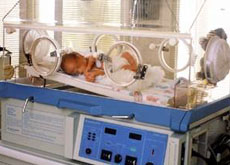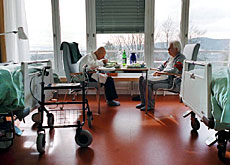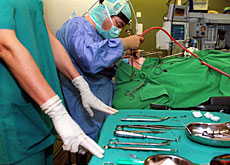Expensive baby treatment causes outcry

Doctors are warning that nitric oxide – a life-saving treatment for babies – will become much more expensive following a new ruling by the Swiss authorities.
The case has been taken up by the Swiss price watchdog, Rudolf Strahm, who is looking into ways to block the price rise.
Nitric oxide is used mainly in children’s hospitals to help babies and young children with breathing difficulties and heart problems. Paediatricians have hailed the gas as safe, effective and cheap.
But doctors are warning that this is set to change following a ruling that hospitals can only use an approved nitric oxide treatment, called INOmax, which is distributed by INO Therapeutics.
“Until now we were able to get nitric oxide from companies on a much cheaper basis,” said Jürg Hammer, head of the intensive care and pulmonology unit at Basel University Children’s Hospital.
“But with the new approval of INO Therapeutics to sell the gas in Switzerland, costs will rise up to 50-fold – which has implications for us in a children’s hospital,” added Hammer.
Hammer estimates that a four-day treatment with nitric oxide will cost SFr20,000 ($15,600) instead of the previous SFr500.
Every year around 150 babies need the treatment in Switzerland.
Higher costs
Doctors claim hospitals will be expected to shoulder the increased costs since the government only reimburses SFr800 per 24-hour treatment for a child in an intensive care unit.
Hammer says this could affect how many patients receive the treatment.
“It has not gone that far [that we have started scaling back treatment]… but it may influence our decision whether we start a child on nitric oxide or not, because it’s so expensive,” Hammer told swissinfo.
The price increase occurred after a Swedish company patented the therapeutic use of nitric oxide for babies and newborns for the European market. The rights attached to the patent were then transmitted to a German firm.
Since the beginning of July, under a new law on therapeutic products, the patented INOmax is the only nitric oxide system authorised for use in hospitals by the Swiss Agency for Therapeutic Products, Swissmedic.
The outcry over the price increase, coupled with official complaints lodged by the hospitals concerned and the cantonal pharmacy of Zurich, has prompted the Swiss price watchdog to open an investigation.
Rudolf Strahm has called on the distributor of the treatment to explain the price rise.
INO Therapeutics
When contacted by swissinfo, INO Therapeutics said it was unfair to compare the approved INOmax treatment with the nitric oxide that had previously been used in hospitals.
“As a licensed pharmaceutical, INOmax is subject to rigorous testing and produced in strictly controlled manufacturing facilities… The value of INOmax is thereby far higher than the value of regular nitric oxide,” said the company in a written statement.
The company strongly denied that its treatment would be 50 times more expensive. It said the average cost of INOmax was SFr9,400 without discount, based on 44 hours treatment.
“We have not raised the price of INOmax. The approved pharmaceutical INOmax is, however, significantly more expensive than the pre-approval technical/industrial nitric oxide that has been accessible to doctors as a last resort before a drug was available,” said INO Therapeutics.
The company added that it would assist the Swiss price watchdog in any way it could in its investigation.
Strahm said that he – in collaboration with the medical and pharmaceutical profession – would be looking at ways to stop the treatment becoming more expensive.
The Swiss Competition Commission has yet to decide whether it, too, will be looking into the case.
swissinfo, Isobel Leybold-Johnson
Since early July, INOmax is the only nitric oxide treatment approved for use in Switzerland.
Doctors are warning that the price of the gas will increase dramatically.
The country’s price watchdog has launched an investigation into the case.

In compliance with the JTI standards
More: SWI swissinfo.ch certified by the Journalism Trust Initiative



You can find an overview of ongoing debates with our journalists here. Please join us!
If you want to start a conversation about a topic raised in this article or want to report factual errors, email us at english@swissinfo.ch.